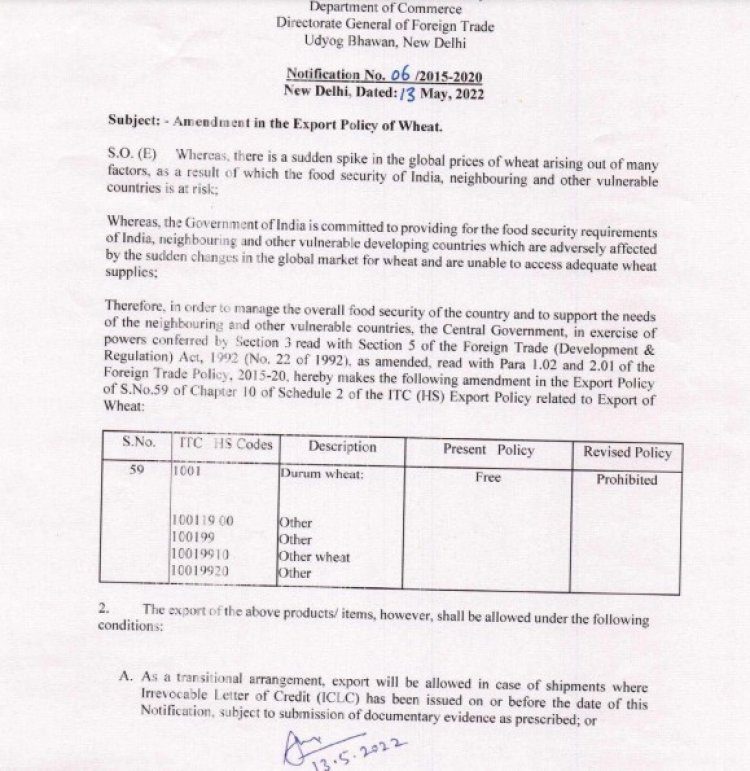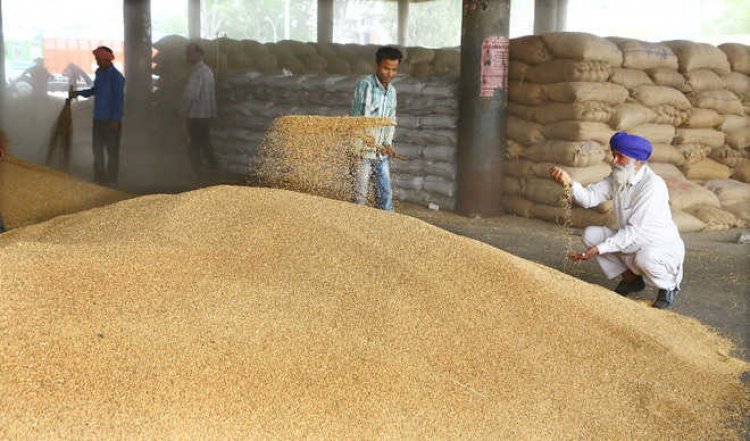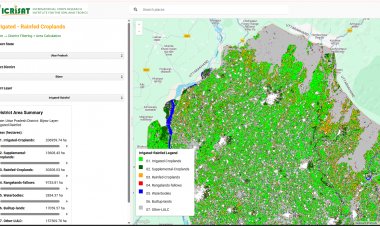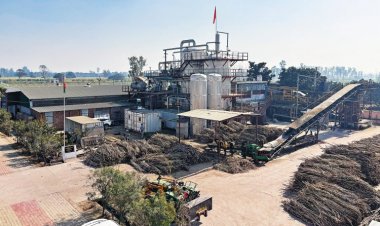Govt prohibits wheat export — an exercise in reining in prices
The DGFT of the Ministry of Commerce issued a notification in this regard on Friday. According to the notification, the export of all kinds of wheat has been prohibited with immediate effect. However, the notification also says that export will be allowed in case of shipments where an Irrevocable Letter of Credit has been issued on or before the date of this notification.

The government has prohibited wheat export. The Directorate General of Foreign Trade (DGFT) of the Ministry of Commerce issued a notification in this regard on Friday. According to the notification, the export of all kinds of wheat has been prohibited with immediate effect.
It is believed that the decision has been made in view of the increase in wheat prices amidst a constantly rising inflation. Wheat production, too, has fallen this time.
The notification also says that export will be allowed in case of shipments where an Irrevocable Letter of Credit has been issued on or before the date of this notification.
The government has allowed through another notification the export of onion seeds. This decision has also come into immediate effect.
Yogesh Dwivedi, CEO, Madhya Bharat Consortium of Farmers Producer Company, told RuralVoice that export would be allowed only in the case of the deals for which payments had been made. Protesting the decision, he said that this was for the first time that even small farmers were getting prices better than MSP (Minimum Support Price).
Some other experts say that only the big companies have made the deals in advance. They had booked rail rakes to transport wheat to the Kandla port. However, when the Railways increased the rake rates, this was also considered to be a step discouraging exports.
But, on the other hand, the government is also trying to make efforts to increase exports. Only a day before the notification, the Commerce Ministry had said that delegations would be sent to nine countries, including Morocco, Tunisia, Indonesia and Thailand, to increase wheat exports. It had also spoken about making a task force on wheat export and holding meetings for export discussions in major wheat-producing states like Punjab, Haryana, Madhya Pradesh (MP), Uttar Pradesh (UP) and Rajasthan. The MP government had also announced some incentives.
Read... Despite decline in wheat production, Centre to send delegations to nine countries to push exports
It is now believed that the decision to prohibit exports has been made under the pressure of inflation. The retail inflation rate reached an eight-year high of 7.79 per cent in April. Food inflation was as high as 8.32 per cent. With wheat being dearer in the market, flour has already started getting dearer. The government sells 50-60 lakh tonnes (lt) of wheat to the mills under the Open Market Scheme every year in order to keep prices under control in the open market. But this seems to be a difficult task this year as the government does not have stocks.

Farmers went in smaller numbers to the government mandis this time as they got prices higher than MSP in the open market. In states like Uttarakhand, Gujarat, Himachal Pradesh and Rajasthan, very few farmers turned up at the public procurement centres to sell their produce in comparison to those who registered. The decision will adversely impact the farmers who, hoping to get better prices, had not sold their produce yet. They will now have to sell it in domestic markets only. While the MSP for wheat is Rs 2,015 per quintal for the Rabi Marketing Season (RMS) 2022-23, farmers have got prices up to Rs 2,300 per quintal in the market.
Read... New trend in wheat procurement; many farmers don’t turn up at public procurement centres despite registration
An unusual rise in temperature this year has led to a decline in wheat production in several states. The government had to reduce its procurement target to less than half. It had earlier fixed a procurement target of 444 lt, which has now been reduced to 195 lt. With farmers not reaching the mandis, even this revised target seemed difficult to attain. As per the information available on the Central Food Grains Procurement Portal (CFPP), 179.89 lt of wheat has been procured so far. However, experts say, that farmers may now head towards the mandis in the wake of the decision to prohibit exports. The procurement usually continues till June 15.
The government may have prohibited wheat exports anticipating the availability in the domestic market, but it is yet to make things clear on the production front. Farmers in most parts of the country say that their production has gone down by 15 to 25 per cent due to the unusual rise in temperature in March and April. However, the government has revised downwards the estimate for wheat production by 5.7 per cent only. The earlier projection for wheat production was 11.13 crore tonnes. It has now been revised to 10.5 crore tonnes. In 2020-21, wheat production stood at 10.96 crore tonnes.
Read... Govt lowers wheat production estimates by 5.7 per cent; public procurement to be not even half that last year
Due to less public procurement, a situation arose in which it could have been for the first time that the old stocks of wheat in the central pool on April 1 may be more than the quantity of wheat procured in the new season. There was 189.90 lt of wheat in the central pool on the said date while only 179.89 lt of wheat has been procured so far. If the government succeeds in procuring 195 lt of wheat as per the revised figures, it will be the lowest since 2010-11. In RMS 2010-11, 225.13 lt of wheat had been procured by the government.
The revised target for public procurement also seemed difficult to attain this year because Punjab, which makes the largest contribution to the central pool, announced to conclude wheat procurement in a phased manner from May 5. Only 95.5 lt of wheat has been procured in the state so far as against the target of 132 lt. The crisis of wheat availability had begun to loom large in such a situation.
Read... Public procurement of wheat to be at 13-year low, may remain lower than old stocks in central pool
The government requires about 260 lt of wheat per annum for distribution under the Targeted Public Distribution System (TPDS). Besides, 109.28 lt of wheat has been allocated for six months of the current year for free distribution of 5kg of foodgrains per person per month under the Pradhan Mantri Garib Kalyan Anna Yojana (PM-GKAY). Also, the buffer stock norms require 75 lt of wheat stocks in the central pool on April 1. Together, these amount to 445 lt. Compared to this, the government will have only 385 lt of wheat with it if we add up the old stocks and the revised target for public procurement.



 Join the RuralVoice whatsapp group
Join the RuralVoice whatsapp group







































